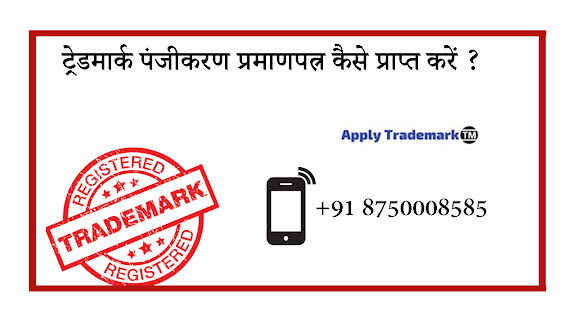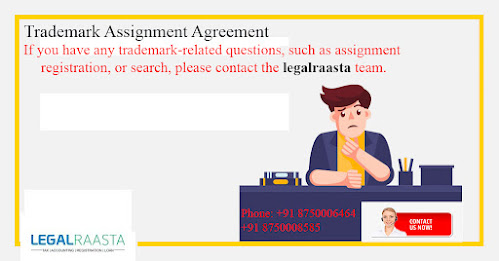Can I register a trademark without a company?
The use of trademarks in company is now necessary. Company
names, emblems, product names, and catchphrases are all examples of trademarks.
To secure one's corporate identity, one must register trademarks to obtain
legal control over their brands. It's critical to keep in mind that the trademark registration process is not
comparable to the trademark filing procedure. The Trademark Registration Process is drawn-out and challenging,
therefore the process doesn't end with the filing alone. So, in this blog post,
we'll talk about how to apply for a trademark on your own or without a
corporation and what challenges one could encounter during the trademark registration procedure in India.
Trademarking a logo protects your unique brand
It is in your best advantage as a developing brand to take
the initiative to trademark your distinctive brand assets. But in order to
register a trademark, you must first have a distinctive logo! If you don't
already have one, work with an experienced logo designer to create the ideal
logo for your brand. Alternatively, you can consult our team, who may also
suggest a unique logo and assist you in creating a logo that is both
distinctive and attractive and will aid in how to apply for trademark
protection.
Why wouldn’t you want to trademark your logo?
The following step after creating your logo is to file a
trademark for it. You don't want to have to trademark your products or services
more than once because it may be a time-consuming and expensive process. This
means that there are a few situations in which it is not advisable to register
your logo, at least not immediately away. Knowing these situations will help
you understand why and how to apply for a trademark.
Ø Nothing
is set in stone: You aren't yet fully committed to the logo or
you know you'll change it soon, which can help with how to apply for a
trademark. This might be the case because you developed a low-effort, quick
design using a logo creator merely to have something ready when your company
began, with the intention of commissioning a professional logo later on when
you have more money to spend. Perhaps you want to change your logo to show that
you want to grow over the next few years. It doesn't make
sense to spend the effort or money to trademark a logo that is only used
temporarily since a logo must be used consistently in order to be protected by
its trademark.
Ø It’s not
unique: It's not original: Be cautious if your logo is somewhat
similar to another one currently in use in your nation. There is a potential
that people will become confused and modify your logo if it is identical to a
well-known, national brand. It is not worth the misunderstanding,
copycat appearance, or potential legal issues with the competing brand. But
let’s say that other company is based in India, and you’re in london, and
you’re both small businesses that primarily serve your local markets. In that
case, you probably won’t run into the issue of people confusing you for the
other company.In this situation, registering your trademark with your state
ought to offer sufficient security.
Ø Your
firm might only exist temporarily: What if you are unsure of how
long your company will exist? Perhaps you only do it as a side gig since you're
not sure you'll want to do it permanently or as a stopgap between full-time
jobs. The same way that it makes no sense to register a logo that is expected
to alter in the near future, it is probably not worthwhile to register a logo
for a company whose long-term viability and trademark application assistance
you are unsure of.
Problems faced to register a trademark without company
Ø Application
in the wrong class of trademarks: This unexpected circumstance
could have been averted with the support of the top trademark agents, like
LegalRaasta, who can also provide guidance on how to apply a trademark
application. A trademark is grouped into a class based on the good or service
it stands for. For instance, you would choose trademark class 33 if you wanted
to sell alcoholic beverages; trademark class 25 if you wanted to sell shoes.
There are 45 trademark classes as well. The government will contest the registration
of a trademark if you apply for one in the incorrect class.
Ø Insufficient
product or service description: The 45 trademark classes are
well-defined yet may be confusing to non-experts. You must therefore provide
accurate descriptions of your product's commodities or services. Although this
will be helpful in applying for a trademark, we found that the majority of
businesses have no idea how to put together a description of their good or
service.
Ø Trademark
issues: Trademark law is broken not just by a trademark that has
been duplicated. It is assumed that you are attempting to develop a trademark
that is deceptively similar if your brand bears a little resemblance to one
that is already registered. Your trademark will be denied if it contains vulgar
or objectionable language.
Ø Official
Terms cannot be trademarked: State and international organization
insignia, as well as their official names, flags, armorial bearings, hallmarks,
and patriotic music, are not registrable trademarks. The trademarks of
individual nations and international organizations, such as their national
insignia, symbol, character, or an animal picture, are prohibited by national
laws.
Ø Terms or
phrases that are disrespectful: Trademarks that contain
derogatory terms or phrases that go against public decency or order are not
eligible for registration. Additionally, it is generally prohibited for harmful
or immoral terms and marks to be registered as trademarks, which clarifies the
process of applying for a trademark.
Conclusion
A trademark
registration application may seem like a fairly straightforward process,
but there are a lot of potential problems that could arise and ultimately lead
to the application being refused or abandoned. In the blog post mentioned
above, we provide information on how to register a trademark without an
attorney and the challenges you may encounter. In light of this, even while
there is no legal prohibition against an individual registering their trademark
themselves, doing so is more practical when done by a professional. An
applicant should decide to work with a trademark knowledgeable professional
expert who will offer advice on how to submit a trademark
application. Contact us for information on how to file for a trademark since
our experts at LegalRaasta are
knowledgeable about the finer points of trademark registration and can help
applicants receive their certificate of registration swiftly and affordably.



.jpg)
Comments
Post a Comment